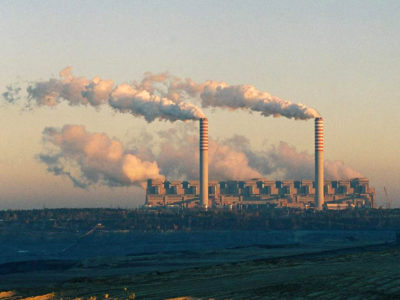The Most Important Environmental Story Of The Week
Fossil Fuel Interests Corrupt Media
 No, it’s not the Biden Administration’s successful push to electrify tens of thousands of USPS vehicles. It’s how Matrix LLC, a consultant in the southeast with significant investments in the energy sector, made massive payments to local media outlets to slant their coverage in favor of dirty power and exorbitant electricity rates. Consider Alabama Power, which
No, it’s not the Biden Administration’s successful push to electrify tens of thousands of USPS vehicles. It’s how Matrix LLC, a consultant in the southeast with significant investments in the energy sector, made massive payments to local media outlets to slant their coverage in favor of dirty power and exorbitant electricity rates. Consider Alabama Power, which
runs and owns a coal-fired power plant that is the largest single source of carbon dioxide emissions in the United States.
An analysis by Floodlight and NPR of the three Alabama news sites with links to Matrix finds overwhelmingly positive coverage of Alabama Power. The review looked at articles on each site that contained the phrase “Alabama Power” and found that the vast majority of pieces either were positive or appeared to mirror a news release by the utility.
In interviews, two former reporters at the Alabama Political Reporter recounted episodes in which articles about Alabama Power received intense and unusual scrutiny from editors. In one case, the story was never published. Its proprietor denies any such influence on the site.
Together, Alabama Power and Florida Power & Light keep the lights on for nearly 7.5 million businesses and households. Since consumers’ payments contribute to much of the two utilities’ profits, much of the money that the companies spend effectively derives from consumers’ bills.
Sometimes, the Alabama Political Reporter would simply run Matrix press releases as news stories.
It’s not just Alabama: unsurprisingly, journalism in Florida is shot through with corruption. The editor of the popular Florida Politics website blandly acknowledges pay-to-play in his coverage.
In an interview, Schorsch says he practices “combination journalism”: He says Florida Politics’ coverage is not dictated by advertisers, but it often gives them favorable coverage. And, he says, sometimes he gives them more coverage.
But the point here is bigger than just one egregiously corrupt consultant and several egregiously corrupt local newspapers, as the NPR story makes clear:
Matrix shrewdly took advantage of the near collapse of the local newspaper industry and a concurrent plunge in trust in media in propelling its clients’ interests.
“The reduction in just the size of the press corps covering state government has created a vacuum that I think tends to be filled by people who have agendas beyond serving the public interest,” says former Miami Herald executive editor Tom Fiedler….
The public bears the brunt of deep cuts in conventional newsroom staffs, Fiedler says, as those driving the news agenda at some newer outlets are often “the special interests – in many cases, the monied interests.”
This is a core environmental issue in the future. There will be no political constituency for combatting and adapting to climate change unless people understand its impacts, and they will not understand its impacts unless they know from the news sources that they consume – which are overwhelmingly local – how climate change works and how it affects their lives. It doesn’t matter if the New York Times puts more reporters on the COP summit. But the collapse of newsrooms means that people will not get that information.
You don’t have to look far to see the carnage. Just this past week, the Providence Journal laid off several editors and reporters, part of the Gannett chain’s massive layoffs around the country.
It isn’t clear who or what can make up the difference. Quality news production is a public good with large positive externalities that cannot be easily monetized. It thus seems unlikely that the for-profit sector can provide it efficiently. I have long advocated for universities to make up the gap, but universities are more concerned with ranking and their own amour propre to get involved in what is seen as the grubby business of acquiring facts.
So now we wait for someone or something to do what needs to be done. And wonder why people are not more concerned about the melting of the planet.
Reader Comments
One Reply to “The Most Important Environmental Story Of The Week”
Comments are closed.







Actually Prof. Zasloff, you answered your own question: “— wonder why people are not more concerned about the melting of the planet,” university leadership cultural values are dominated by:
self-centeredness, egocentricity, egomania, self-interest, selfishness, self-seeking, self-serving, self-regard, self-absorption, self-obsession, self-love, narcissism, self-admiration, self-adulation, and vanity.
I hope and pray, for the sake of perpetuating an acceptable quality of life for our newest generations, that academics like you and Prof. Farber shall unite to change the university culture at last where “universities — make up the gap” before time is up. That is “what needs to be done.”
As UN Chief Guterres said most recently after the COP 27 failure: “We are in the fight of our lives, and we are losing,” “Greenhouse gas emissions keep growing, global temperatures keep rising, and our planet is fast approaching tipping points that will make climate chaos irreversible,” and“We are on a highway to climate hell with our foot still on the accelerator”
Thank you for focusing on making the right things happen, hopefully in time, UC is most truly our last resort.